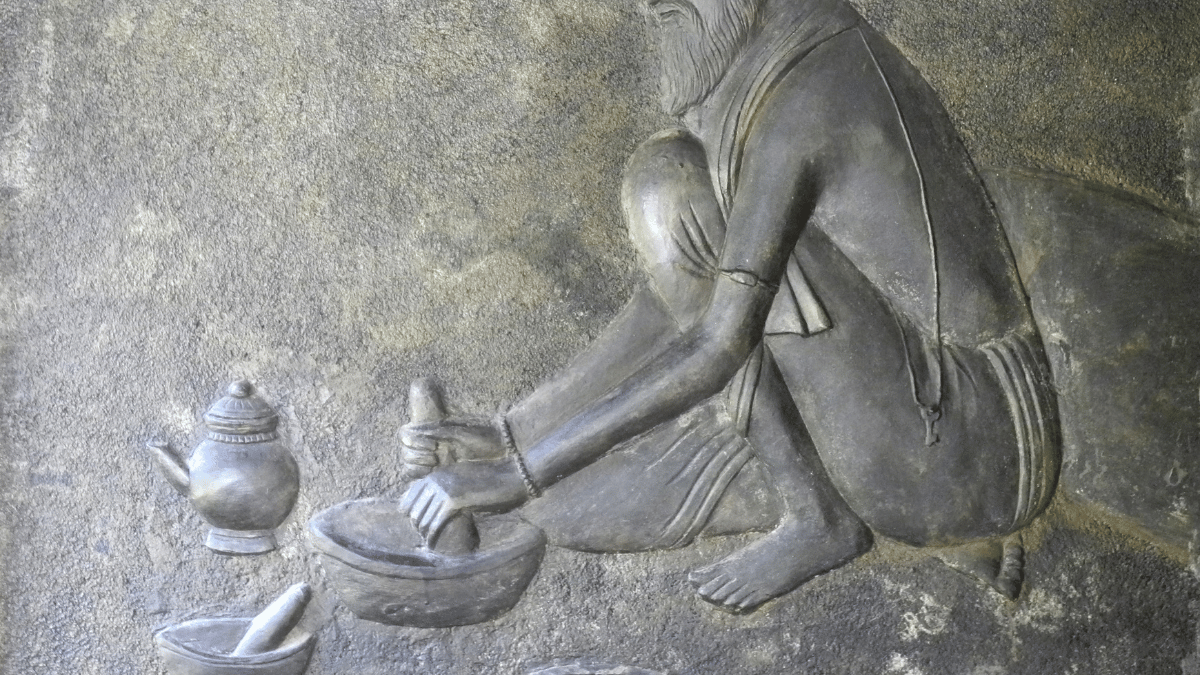What is Ayurveda?
Science of Life

Ayurveda | Ayur = Life – Veda = Knowledge
In a world increasingly turning towards natural and holistic approaches to health and wellness, Ayurveda stands out as a beacon of ancient wisdom, offering a comprehensive and time-tested holistic healing system that addresses the body, mind, and spirit. Rooted in the ancient traditions of India, Ayurveda translates to “the science of life” and encompasses a profound understanding of the interconnectedness between the individual and the universe, providing practical guidance for achieving balance, vitality, and longevity.
At its core, Ayurveda is founded on the principle that each individual is unique and possesses a distinct constitution or “Prakriti” composed of the three doshas: Vata, Pitta, and Kapha. These doshas represent different combinations of the five elements—ether, air, fire, water, and earth—that manifest in various proportions in each person, influencing their physical, mental, and emotional characteristics.
Central to Ayurvedic philosophy is the concept of “svastha,” which translates to “established in oneself.” According to Ayurveda, proper health is not merely the absence of disease but a vibrant well-being that encompasses harmony and balance in all aspects of life—physical, mental, emotional, and spiritual. Achieving svastha involves aligning with nature’s natural rhythms and cycles, cultivating self-awareness, and making conscious choices that support health and vitality.
Ayurveda offers a holistic approach to health and healing encompassing various modalities, including diet and nutrition, herbal medicine, lifestyle practices, detoxification, yoga, meditation, and mindfulness. Central to Ayurvedic healing is the “dinacharya,” or daily routine, emphasising the importance of establishing healthy habits and rituals supporting balance and well-being.
One of the fundamental principles of Ayurveda is the concept of “Agni,” or digestive fire, which plays a central role in the body’s ability to metabolize food, eliminate toxins, and maintain optimal health. According to Ayurveda, imbalances in agni can lead to the accumulation of ama, or toxins, in the body, which can manifest as disease and imbalance. Therefore, Ayurvedic healing often begins with restoring and supporting healthy digestion through dietary modifications, herbal remedies, and lifestyle practices.
Another fundamental principle of Ayurveda is the concept of “srotas,” or channels of circulation, through which the body’s vital energies flow. According to Ayurveda, blockages or imbalances in the srotas can lead to disease and dysfunction. Ayurvedic therapies such as massage, detoxification, and herbal medicine are aimed at clearing and nourishing the srotas, restoring balance and vitality to the body.
In addition to physical health, Ayurveda places great emphasis on mental and emotional well-being, recognizing the profound influence of the mind on overall health and vitality. Meditation, pranayama (breathwork), and mindfulness are integral to Ayurvedic healing, helping to calm the mind, reduce stress, and promote emotional balance and clarity.
In summary, Ayurveda offers a holistic and comprehensive approach to health and wellness that encompasses the body, mind, and spirit. Rooted in ancient wisdom and guided by timeless principles, Ayurveda provides practical tools and techniques for achieving balance, vitality, and longevity, allowing individuals to thrive in harmony with themselves and the world around them.
History and Origins of Ayurveda

Ayurveda, often hailed as the oldest healing system in the world, traces its origins back to India’s ancient civilisation, where it flourished alongside other profound philosophical and spiritual traditions. The history of Ayurveda is rich and multifaceted, shaped by centuries of cultural exchange, intellectual inquiry, and spiritual exploration.
The origins of Ayurveda can be traced back to the Vedic period, which spanned from around 1500 BCE to 500 BCE. During this time, India’s ancient sages and seers, known as the Rishis, composed the Vedas—the sacred texts that form the foundation of Hindu philosophy and spirituality. Among these texts, the Atharva Veda contains hymns and verses that offer insights into the ancient Vedic peoples’ healing practices and medicinal herbs.
The foundational principles of Ayurveda were further elaborated upon in the classical Ayurvedic texts known as the “Samhitas,” which were compiled between 600 BCE and 400 CE. The most renowned among these texts is the Charaka Samhita, attributed to the sage Charaka, often referred to as the father of Ayurvedic medicine. The Charaka Samhita provides a comprehensive overview of Ayurvedic theory and practice, covering anatomy, physiology, diagnosis, treatment, and ethics.
Another seminal Ayurvedic text is the Sushruta Samhita, attributed to the sage Sushruta, who is considered the father of surgery in Ayurveda. The Sushruta Samhita is renowned for its detailed descriptions of surgical techniques, including plastic surgery, cataract surgery, and the extraction of foreign bodies. It also contains extensive discussions on anatomy, diseases, and pharmacology.
Over the centuries, Ayurveda continued to evolve and adapt, incorporating influences from other ancient healing traditions such as Buddhism, Jainism, and Greek medicine. During the reign of the Mauryan emperor Ashoka in the 3rd century BCE, Ayurveda experienced a period of great expansion and patronage, with the establishment of hospitals, medical colleges, and research institutions across the Indian subcontinent.
The spread of Ayurveda beyond the borders of India can be attributed to the influence of Indian traders, scholars, and travellers who carried the teachings of Ayurveda to distant lands such as Sri Lanka, Tibet, China, Persia, and Greece. In these regions, Ayurveda interacted with local healing traditions, giving rise to diverse syncretic forms of medicine and healing.
Despite periods of decline and suppression, Ayurveda has endured through the centuries, preserved and transmitted through lineages of physicians, scholars, and practitioners. In the modern era, Ayurveda has experienced a resurgence of interest and appreciation, both in India and around the world, as people seek alternative approaches to health and wellness that are holistic, natural, and sustainable.
In conclusion, the history of Ayurveda is a testament to the enduring wisdom and resilience of ancient healing traditions. Rooted in the spiritual insights of the Vedic sages and refined through centuries of practice and inquiry, Ayurveda continues to inspire and empower individuals on their journey towards health, harmony, and wholeness.
Key Principles and Concepts of Ayurveda

Ayurveda, the ancient science of life, offers a profound understanding of health and wellness rooted in the interconnectedness of the body, mind, and spirit. At the heart of Ayurveda are several fundamental principles and concepts that form the basis of its holistic approach to healing. Let’s delve into these fundamental principles:
The Five Elements (Panchamahabhutas):
Ayurveda views the universe, as well as the human body, as composed of five fundamental elements—earth (Prithvi), water (Jala), fire (Tejas), air (Vayu), and space (Akasha). These elements combine in various proportions to form the three doshas—Vata, Pitta, and Kapha—that govern all physiological and psychological functions in the body.
The Three Doshas:
According to Ayurveda, each individual possesses a unique combination of the three doshas—Vata, Pitta, and Kapha—that determine their physical constitution, mental temperament, and disease susceptibility. Imbalances in these doshas are believed to be the root cause of illness, while harmony and balance lead to health and vitality.
Prakriti (Constitution):
Prakriti refers to an individual’s inherent constitution, determined by the predominant doshas present at birth. Understanding one’s prakriti allows personalized health recommendations and lifestyle modifications to maintain balance and prevent disease.
Dinacharya (Daily Routine):
Ayurveda emphasizes the importance of aligning daily activities with the natural rhythms of the day to promote health and well-being. Dinacharya includes practices such as waking up early, cleansing rituals, exercise, meditation, and proper meal times, tailored to suit an individual’s constitution.
Ritucharya (Seasonal Routine):
Just as each person has a unique constitution, Ayurveda recognizes the influence of the seasons on health and wellness. Ritucharya prescribes specific dietary and lifestyle practices for each season to help the body adapt to environmental changes and maintain balance.
Ahara (Diet):
Diet plays a crucial role in Ayurveda, as food is considered a medicine that directly impacts the doshas and overall health. Ayurvedic dietary guidelines emphasize whole, seasonal foods that are fresh, nutritious, and easily digestible while also considering individual constitution and digestive capacity.
Swasthavritta (Health Maintenance):
Swasthavritta encompasses a range of preventive healthcare practices aimed at maintaining optimal health and preventing disease. These practices include daily routines, dietary guidelines, hygiene, detoxification, rejuvenation therapies, and mental wellness techniques.
Nidana (Diagnosis):
Ayurvedic diagnosis involves a comprehensive assessment of an individual’s physical, mental, and emotional state, as well as their medical history and lifestyle factors. Diagnostic techniques include observation, palpation, questioning, and pulse diagnosis (Nadi Pariksha).
Upakarma (Treatment):
Ayurvedic treatments aim to restore balance and harmony to the body and mind through a combination of lifestyle modifications, dietary changes, herbal remedies, detoxification therapies (Panchakarma), rejuvenation therapies (Rasayana), and mental wellness practices (Yoga and meditation).
Satmya (Suitability):
Ayurveda recognizes that each person is unique and that health recommendations should be tailored to suit individual constitutions, preferences, and circumstances. Satmya refers to suitability, ensuring that health practices are appropriate and beneficial for each individual.
In essence, the key principles and concepts of Ayurveda offer a holistic framework for understanding health and wellness, emphasizing the interconnectedness of the body, mind, and spirit. By aligning with the natural rhythms of life and honouring individual uniqueness, Ayurveda empowers individuals to cultivate balance, vitality, and harmony.
Significance of Ayurveda in Modern Times

In today’s fast-paced world, where stress, pollution, and lifestyle imbalances are rampant, the ancient science of Ayurveda offers a beacon of hope and healing. Despite the advancements in modern medicine, the significance of Ayurveda in modern times remains unparalleled. Let’s explore why Ayurveda continues to be relevant and invaluable in our contemporary era:
Holistic Approach to Health:
Ayurveda adopts a holistic approach to health and wellness, recognizing the interconnectedness of the body, mind, and spirit. In an age where many healthcare systems focus solely on treating symptoms, Ayurveda addresses the root cause of illness by restoring balance and harmony to all aspects of life.
Personalized Medicine:
One of the most significant contributions of Ayurveda to modern healthcare is its emphasis on personalized medicine. Unlike one-size-fits-all approaches, Ayurveda recognizes that each individual is unique and requires customized treatment plans based on their unique constitution, lifestyle, and health goals.
Prevention and Wellness Promotion:
While modern medicine excels in treating acute illnesses, Ayurveda shines in prevention and wellness promotion. By empowering individuals to make conscious lifestyle choices, Ayurveda helps prevent disease before it manifests, leading to long-term health and vitality.
Natural and Sustainable Therapies:
In an era of over-reliance on pharmaceutical drugs and invasive procedures, Ayurveda offers natural and sustainable therapies that support the body’s innate healing abilities. From herbal remedies and dietary modifications to detoxification therapies and rejuvenation practices, Ayurveda provides gentle yet effective solutions for optimal health.
Mind-Body Connection:
Ayurveda acknowledges the profound connection between the mind and body, recognizing that emotional well-being is essential for overall health. By integrating practices such as yoga, meditation, and mindfulness, Ayurveda helps individuals cultivate mental resilience, reduce stress, and enhance emotional balance.
Environmental Sustainability:
As concerns about environmental degradation and climate change mount, Ayurveda’s eco-friendly approach to healthcare is more relevant than ever. Ayurvedic principles promote harmony with nature, advocating for sustainable living practices that honour the Earth and preserve its resources for future generations.
Integrative Healthcare:
In recent years, there has been a growing interest in integrative healthcare approaches combining the best of conventional and complementary therapies. Ayurveda seamlessly integrates with modern medicine, offering a complementary framework that enhances the effectiveness of conventional treatments and promotes holistic healing.
Empowerment and Self-Care:
In a world where individuals often feel disempowered and disconnected from their health, Ayurveda empowers people to take control of their well-being through self-care practices and lifestyle modifications. By fostering self-awareness and self-responsibility, Ayurveda inspires individuals to actively participate in their healing journey.
In conclusion, the significance of Ayurveda in modern times lies in its ability to provide holistic, personalized, and sustainable solutions to the health challenges of our era. By embracing Ayurveda’s timeless wisdom, we can cultivate vibrant health, inner harmony, and a deep connection to ourselves and the world.
